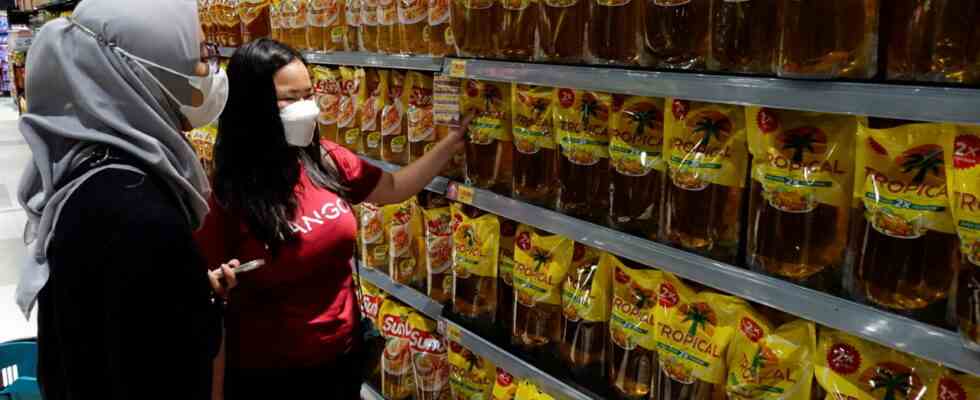Status: 05/03/2022 08:22 a.m
Indonesia covers two thirds of the world’s palm oil needs – because it became unaffordable for many in the country, the export has now stopped. What pleases the population could further damage the agricultural economy and the climate.
In oil Fried tofu or tempeh, another soybean variant, fried rice with vegetables, meatballs: Indonesian cuisine relies heavily on cooking oil. The ingredient is indispensable, especially in the poorer sections of the population: “I hope that oil prices will not continue to rise, Mr. Jokowi – please consider the poor people here, they will no longer be able to cope if prices continue to rise”, with these words he directs himself a fried rice seller told Reuters news agency to Indonesian President Joko Widodo, known as Jokowi.
Because the export of palm oil for Indonesia is so incredibly successful – almost two thirds of the world’s palm oil requirements are covered by Indonesia – the food in the country itself has become more and more expensive. Manufacturers hoarded supplies intended for export, and prices for the available cooking oil skyrocketed. Thousands of Indonesians have taken to the streets in recent weeks to demonstrate for affordable food.
Encouragement from the food stall operators
And President Jokowi reacted – with an export ban. “I will closely monitor the impact of this policy so that we have enough cooking oil in the country,” he announced. The export ban will only apply until prices have stabilized – a liter of cooking oil should not cost more than 90 eurocents, says the Indonesian government.
Most Indonesians support the move and hope it will have a quick effect: “I think his policy is good, it can stabilize oil prices,” says a seller of fried tofu.
Indonesia’s food stalls rely on palm oil: a cook in Jakarta turns a banana in hot frying fat.
Image: picture alliance / ZUMAPRESS.com
But the rest of the world panicked. Palm oil is contained in countless products: shower gel, chocolate cream, plastic toys, cleaning products, biscuits, instant noodles. Its consumption goes beyond mere cooking. And all of these products are in danger of becoming more expensive as a result of the export ban on palm oil.
South Asian countries in particular, including Pakistan, Bangladesh and India, obtain most of their palm oil from Indonesia. Like many other countries, they have a problem covering their needs with other cooking oils – because the market for sunflower oil has also been badly affected by Russia’s war in Ukraine.
Problems for producers – and national currency
Consumers in Indonesia may be happy about cheaper cooking oil, but producers are suffering from the move. An oil farmer fears he will go broke and points out that crude palm oil has a short shelf life. If it can’t be exported, the producers will have problems.
In addition, experts are critical of the economic impact on the country – because the export of palm oil brings millions of US dollars into the country. If these currencies disappear, “it will attack the Indonesian currency, it will destabilize Indonesia’s financial system and damage our currency reserves in the long term,” fears Bhima Yudhistira, director of the Center for Economic and Legal Studies in Celios.
So Indonesia cannot simply outsource its oil crisis. And anyone who hopes that there will be any positive effect from a palm oil ban should consider: Other cooking oils require larger acreage. In addition, some countries in Africa and India are weighing up whether they want to start palm oil cultivation.
No palm oil from Indonesia
Lena Bodewein, ARD Singapore, May 2, 2022 12:01 p.m

